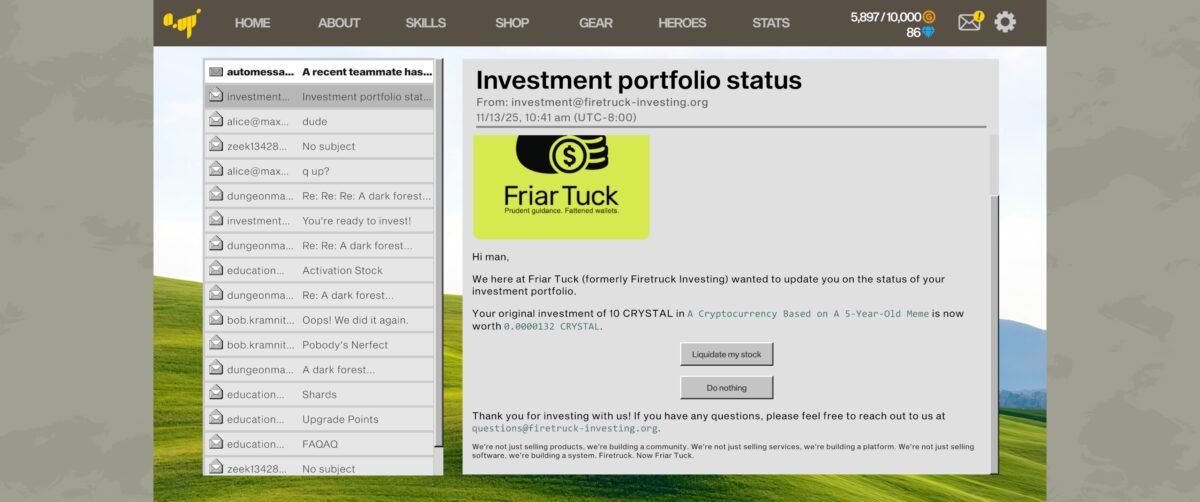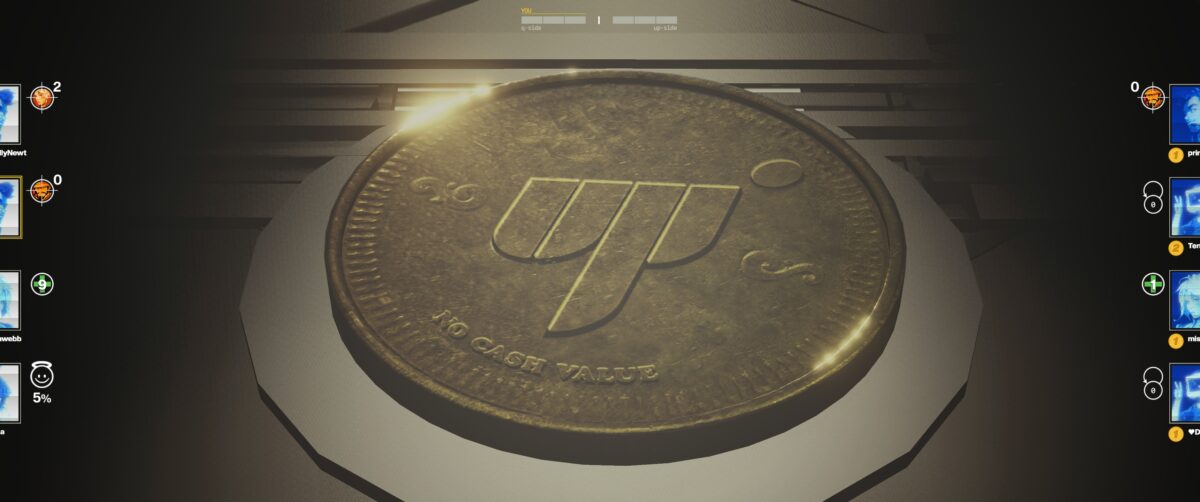Q-Up is a fantastic video game parody, but not just because of its humor. What some video game parodies forget to do is to make an enjoyable game. Q-Up goes from funny gag to a genuinely great game, the ultimate crowning achievement of any parody.
A successful parody becomes its own thing out of what it’s poking fun at. Airplane, Teenage Mutant Ninja Turtles, Weird Al and so on. All of these have become more than just being a spoof. Q-Up is fascinating, honestly.
So what do you do in Q-Up? Well, the world of the game is set up as a game company has devised an esport that is truly fair. That’s coin flipping. Yes, Q-Up is a coin flipping esport, and if that sounds funny, it gets deeper. See, Q-Up is specifically a parody of the esports scene, including a killer carousel of fake news from different websites.
Having written for one of the sites I’m convinced that it’s targeting, and having sat in midst of similar headline pitches, I got a particular kick out of them.
Q-Up will also shower you with a variety of emails written by various staff from the in-world developers. These range from absolute mathematical nonsense in the vague guise of game design or a classic CEO is leaving the company spiel. A common one is if you happen to lose the flip three times in a row, a representative or even the CEO will write to you to apologise. Q-Up is all about fairness, to be fair.
Q-Up is Deeper Than it Looks

The game isn’t just about flipping coins. Q-Up sports a rather easy to understand skill system, but that’s incredibly deep. Rather than a skill tree, skills will appear on pegs as you level up. Additional abilities will be granted to you as you level up as well, which will sometimes require having a bit of a think about where it goes. These will activate under certain conditions, like on a win, loss or even landing on the Q side of the coin.
Some of the skill pegs will activate other pegs around them, which sets off this incredible chain of events that’s entirely presented through text. See, on each flip, Q-Up grants points to feed into the two pools of points. Experience points level you up, grant skills and the like. Then Q Points link with your overall rank, like in an esport.
However, if you’ve gone in with a particular setup, on a loss, it’s not uncommon to find the deducted Q Points multiplying themselves into the millions – just like they would on a win. It becomes a weird balance of “haha, this is a coin flipping game” and becoming the esport sweat the game is clearly ripping on.
It’s fascinating how Q-Up manages to trick my brain into believing that there’s more on the line than a few experience points. There’s no one to cuss out, or get into a shouting match over the text chat with. No one’s spamming “GG” after stomping all over another team.
Yet there I am, sinking into my chair as if I’d just gambled away my house, as I drop ranks once again, just after making it back after a few games. It’s a bizarre thing to consider.
Smartly Built Esports Parody
The game is multiplayer, but it works asynchronously. Matchmaking is real, but there are no other actual players within the match. It doesn’t matter anyway, because the gist of each game is to have yourself set up for success, don’t fret about anything else.
That is, until you dig into the different classes. You’ll need to earn XP with each one, unlocking the unique skills amongst them. It’s great to have mixing and matching skills, especially once you start getting into the super niche ones, which hinge on extreme circumstances. It’s all-in or nothing.
Which is why Q-Up is beyond just a basic parody. The gags and framing around the game certainly fit that bill, but the game itself is far beyond just a one-and-done joke. This is a game where I’ve spent a few hours now just staring at a giant coin being flipped. I’m even getting peeved when I lose a ton of points, seeing the other players win big instead.

Plenty of video games have come and used the medium to poke at the games industry, but rarely do they stick the landing of being a decent game. Q-Up goes beyond that by being an incredible autobattler, combined with a tense progression system that entirely hinges on your understanding of the game’s mechanics.
It’s also smartly made. Even though it has an online component, I could see this game remaining online forever, simply because all the data from various players is presumably stored. Even if the player count drops naturally over time, Q-Up will probably never really die. I assume as long as the connecting server is hooked up, it’ll divert players into games regardless.
Q-Up has a ceiling
All said, Q-Up does have a ceiling before I began to drift from it. The hours turned into an hour or so, as at some point, progression can feel slow if you’re trying to figure out a new build.
Also, as much as I enjoy the bite-sized humor from the emails, at some point, the jokes do begin to grow thin. They’re all still really clever, but I’ll grab my crystals and upgrade, thank you very much.
Q-Up Review

Q-Up is stellar, a true video game parody that does what all great parodies do and stands on its own. It’s needle-precision strikes of humor, prodding at all sides of the industry, media, and player included, are all backed by an intricate autobattler that goes above and beyond what it needed to.
I’m a huge fan of what it’s putting down, and an even bigger fan of its sense of style. The best thing is, it’s really easy to pick up and play for a bit, and I’ll probably cycle back around to it as time goes on. Q-Up is truly, really, great.
| Q-Up | |
| Pros | Cons |
| A genuinely fantastic parody of esports | If you’re not a fan of the gag, this won’t entice |
| It’s fascinating how much you can get invested in coin flipping | It’s still a game about coin flipping |
| The game has an excellent sense of style | |
| Various skills and loadouts give the game a depth that isn’t expecting | |
Platforms: PC
Developer: Everybody House Games
Publisher: Everybody House Games
Release date: 5 Nov, 2025






